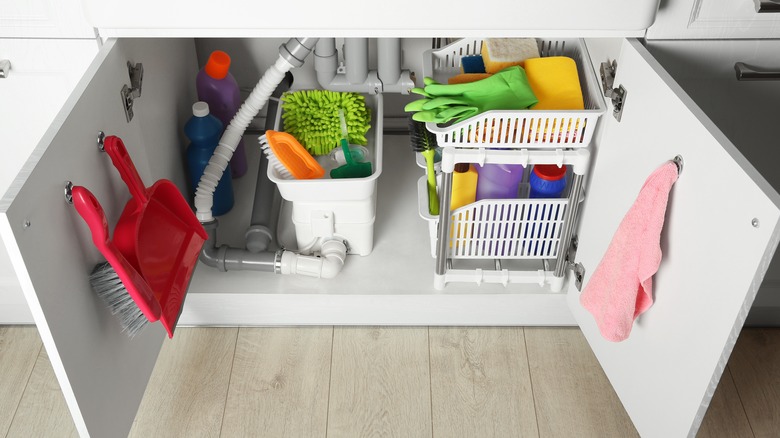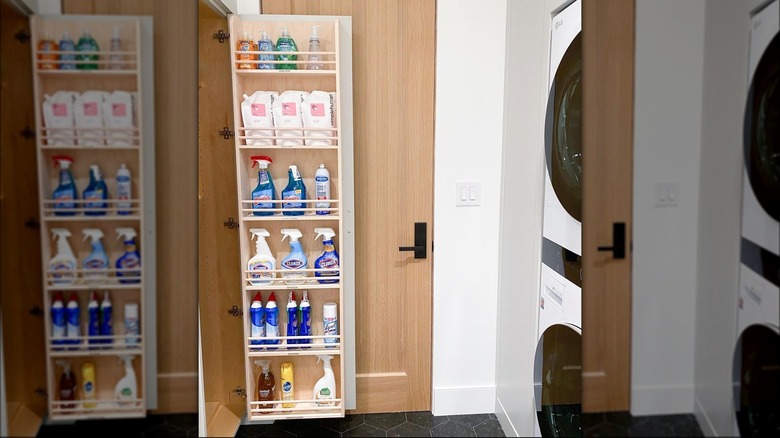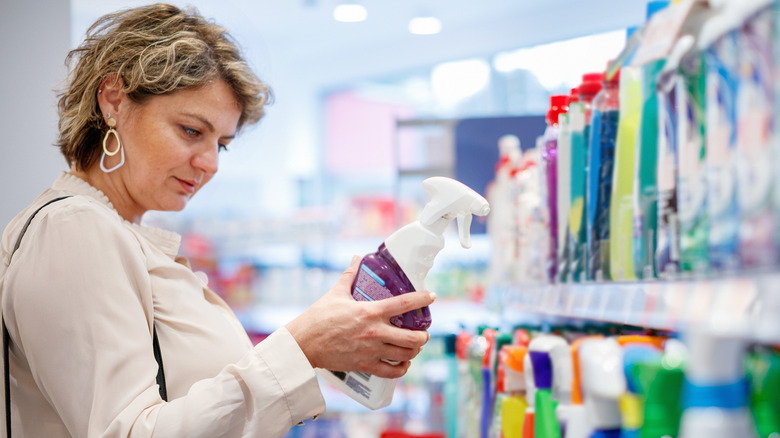Follow This Rule When Storing Cleaning Products In Your Kitchen Cabinets
No matter how perfectly organized your kitchen cabinets are, you're still likely making some common kitchen storage mistakes. While many, like not optimizing shelf space, are harmless, others can have serious consequences. Namely, you might be storing your cleaning products all wrong. Yes, stashing your supplies under the kitchen sink seems like a no-brainer, so they're easily accessible and not constantly on display, but it can be dangerous. Keeping such products close to the floor poses a major health risk for kids and pets who can easily access them.
Indeed, according to the National Library of Medicine, household cleaning products rank as the second most common cause of unintentional poisoning in children under six in the U.S. While natural cleaners, like vinegar and baking soda, aren't toxic, most store-bought options are packed with harmful chemicals. Not to mention that most cleaners need to be stored in a cool, dry area whereas the closed-off space under your sink can be quite humid due to limited ventilation and the heat generated by water pipes.
Moving your essentials to a higher kitchen cabinet isn't ideal either. Because of the toxic nature of many ingredients featured in cleaning products, it's best to keep them away from anywhere they may come into contact with food. In fact, the golden rule to follow when storing cleaning products is to take them out of your kitchen and move them to a safer space instead.
Where you should actually store cleaning products
When choosing the best location to store cleaning products, first and foremost, find somewhere high. That way, the most vulnerable members of your family won't be able to reach them. Next, you need to ensure that the space is cool and dry and that it has good ventilation. This means no direct sunlight and no major temperature swings. Any humid spot, or one that's positioned near an open flame or close to hot pipes is also an absolute no-go due to the flammable nature of most popular household cleaners.
While speaking with MarthaStewart.com, Malaika Lubega, a professional organizer, interior decorator, and the owner of Huza Home Concepts, suggested: "Storing items on wall-mounted shelves or utilizing useful vertical space in a utility room, laundry room, or even in the garage." Certified building biologist, environmental consultant, and the co-founder of Branch Basics, Marilee Nelson took it one step further, recommending finding a storage space that's as far away from your living quarters as possible.
"People don't realize that having toxic cleaners scattered throughout their home creates a low-level chemical soup that everyone in the family breathes and absorbs through the skin 24/7," she explained. Another pro tip to keep in mind is that anything scented shouldn't be stored in your kitchen. Not just cleaners, but scented trash bags too, because they're not typically made of food-grade plastic. This means that the chemicals used to give off that nice smell can be absorbed by foodstuffs that are kept in their vicinity, potentially making them toxic to eat.
Are common household cleaners really dangerous?
Unfortunately, most common household cleaners are formulated using harmful chemicals, which can irritate your eyes and throat, cause headaches, and even lead to chronic respiratory issues such as asthma. That's because, as Marilee Nelson detailed in an interview with MarthaStewart.com, "Products leach their ingredients into the air, many of which are harmful volatile organic compounds (VOCs)."
The American Lung Association warns about VOCs, in particular, noting how dangerous chemicals found in popular cleaning supplies can vaporize at room temperature and release these harmful compounds into the air you breathe. Just a few common products that give off VOCs include dishwashing liquid, upholstery cleaners, floor polish, oven cleaners, and chlorine bleach. And while some companies may claim that their products are "green," they can't necessarily be trusted either.
The law doesn't currently compel manufacturers to reveal every single ingredient in any given product. Of course, eliminating these from your home altogether would be ideal, but that isn't a realistic option for most families — especially those on a budget. Hence why storing them properly, i.e. away from your kitchen entirely, can at least help mitigate some of the potentially hazardous side effects.


